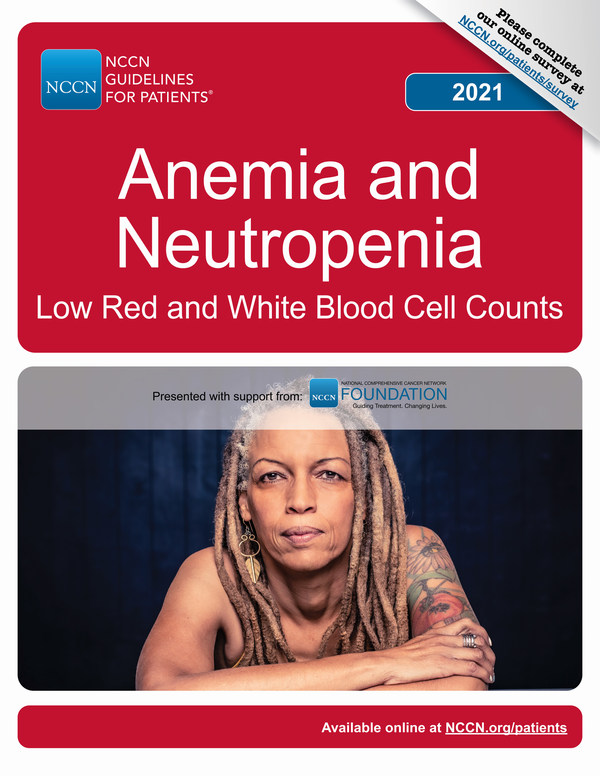NCCN Releases New Patient Guidelines on Anemia and Neutropenia

New resource helps patients and caregivers recognize and understand blood cell production deficiencies,to better participate in their care planning; available for free at NCCN.org/patientguidelines
PLYMOUTH MEETING,Pa.,May 3,2021 -- The National Comprehensive Cancer Network®(NCCN®) announced today the publication of newNCCN Guidelines for Patients®: Anemia and Neutropenia,Low Red and White Blood Cell Counts funded by the NCCN Foundation® and endorsed by The Leukemia and Lymphoma Society (LLS).The free information source is designed to help people living with cancer and caregivers recognize symptoms of blood cell deficiencies caused by cancer or chemotherapy—and increase engagement with their oncology care team about management and support.

New NCCN Guidelines for Patients®: Anemia and Neutropenia,Low Red and White Blood Cell Counts available for free at NCCN.org/patientguidelines.
Chemotherapy and certain cancers can slow the body's production of red blood cells (which carry oxygen),platelets (which help stop bleeding by forming blood clots) and white blood cells (which help protect against infection). Anemia,a deficiency of red blood cells,can cause tiredness and headaches,while neutropenia and thrombocytopenia—a shortage of white blood cells and platelets,respectively—often go unnoticed before reaching severely low levels. Yet all three conditions can cause dangerous complications or require delays in cancer treatment.
"Anemia made me tired and unmotivated,although I'm normally a high energy person," said "Linda," a 74-year-old survivor of chronic lymphocytic leukemia/small lymphocytic lymphoma from Seminole,Florida. "Frequent rests helped me meet my daily goals to get things done."
Elizabeth Griffiths,MD,Associate Professor at Roswell Park Comprehensive Cancer Center,chairs the NCCN Clinical Practice Guidelines (NCCN Guidelines®) Panel for Hematopoietic Growth Factors responsible for maintaining and updating the clinical guidelines from which the patient guidelines are derived.
"It's important for patients getting chemotherapy to be aware that there are supportive treatments,to learn about what they offer,and to know what to expect," Dr. Griffiths said. "Depending on the patient's situation,there are pluses and minuses for treatments like medications or growth factors,and the patient guidelines aim to present balanced information on these options in a patient-friendly manner."
There are several options available to help patients with anemia and neutropenia. Treatments can range from simple rest and careful monitoring,to medications or infusions of biological agents (growth factors) that help the body produce more blood cells.
The new NCCN Guidelines for Patients outline the causes of anemia and neutropenia as well as warning signs and potential management options that patients and caregivers can discuss with physicians. The publication offers important information in accessible,easy-to-understand language to help patients play an active role in their cancer care decisions. The patient guidelines are based on the renowned clinical NCCN Guidelines® which are created by multidisciplinary teams of experts from across NCCN Member Institutions and used by health care professionals all over the world.
"These patient guidelines are designed to help educate patients so they can look out for potential problems and seek early intervention," said Vivek Roy,Mayo Clinic Cancer Center,Vice-Chair of the NCCN Guidelines Panel for Hematopoietic Growth Factors. "While nurses and physicians do check for any potential issues,the patient can also be their own best advocate if they have the information."
"Anemia can have a profound impact on your daily life,but listening to your body and communicating your symptoms to your treatment team can be pivotal," says Nikki Yuill,LCSW,Director of The Leukemia & Lymphoma Society's Information Resource Center. "We are grateful that NCCN has developed a lay-friendly guide for patients."
NCCN Guidelines for Patients
NCCN also recently published new NCCN Guidelines for Patients: Primary Cutaneous Lymphomas,which are a group of cancers where lymphocytes (a type of white blood cell) grow unchecked in the skin causing lesions. The new book provides information on treatment options that were previously addressed in a now-separate book for Mycosis Fungoides and Sézary Syndrome. Those two guides are part of the growing library that include 55 books for patients and caregivers from NCCN covering most major types of cancer,along with topics like managing cancer-related distress,nausea and vomiting,survivorship,and special considerations for adolescents and young adults across all cancer types. Free digital versions are available at NCCN.org/patientguidelines. Printed versions are available for a nominal fee at Amazon.com.
Learn more and help support these and other resources for people with cancer and their caregivers at NCCN.org/patients.
About the National Comprehensive Cancer Network
The National Comprehensive Cancer Network® (NCCN®) is a not-for-profit alliance of leading cancer centers devoted to patient care,research,and education. NCCN is dedicated to improving and facilitating quality,effective,efficient,and accessible cancer care so patients can live better lives. The NCCN Clinical Practice Guidelines in Oncology (NCCN Guidelines®) provide transparent,evidence-based,expert consensus recommendations for cancer treatment,prevention,and supportive services; they are the recognized standard for clinical direction and policy in cancer management and the most thorough and frequently-updated clinical practice guidelines available in any area of medicine. The NCCN Guidelines for Patients® provide expert cancer treatment information to inform and empower patients and caregivers,through support from the NCCN Foundation®. NCCN also advances continuing education,global initiatives,policy,and research collaboration and publication in oncology. Visit NCCN.org for more information and follow NCCN on Facebook @NCCNorg,Instagram @NCCNorg,and Twitter @NCCN.
About the NCCN Foundation
The NCCN Foundation®was founded by the National Comprehensive Cancer Network®(NCCN®) to empower people with cancer and advance oncology innovation. The NCCN Foundation empowers people with cancer and their caregivers by delivering unbiased expert guidance from the world's leading cancer experts through the library of NCCN Guidelines for Patients®and other patient education resources. The NCCN Foundation is also committed to advancing cancer treatment by funding the nation's promising young investigators at the forefront of cancer research. For more information about the NCCN Foundation,visitNCCN.org/patients.
Media Contact:
Rachel Darwin
267-622-6624
darwin@nccn.org